With a logo adorning some of the fastest cars on the planet and a household name synonymous with extreme sports, if you’ve ever heard of energy drinks, you’ve definitely known of Red Bull energy drinks.
But what exactly goes into the iconic silver can, and just how exactly do all the ingredients come together to give you that supposed energy boost you desire?
In short, your usual 8.4 fl.oz can of Red Bull will net you 110 calories, 27g of sugar, 80mg of caffeine along with a handful of other ingredients, notably taurine, sodium, and B-Vitamins
For the longer, more detailed answer as to what exactly you’ll find in a can of Red Bull, read on to find out.
Contents
Red Bull Nutrition Facts
First up, let’s figure out the nutritional value of your standard 8.4 fl.oz Red Bull can, with a quick look at the nutrition facts.
| Typical Values | Red Bull (8.4 fl.oz) |
| Energy | 110 calories |
| Fat (Of which Saturated) | 0g (0g) |
| Carbohydrate (Of which Sugars) | 28g (27g) |
| Caffeine | 80mg |
| Sodium | 105mg |
| Vitamin B3 (Niacin) | 22mg |
| Vitamin B5 (Pantothenic Acid) | 5mg |
| Vitamin B6 | 5mg |
| Vitamin B12 | 5.1µg |
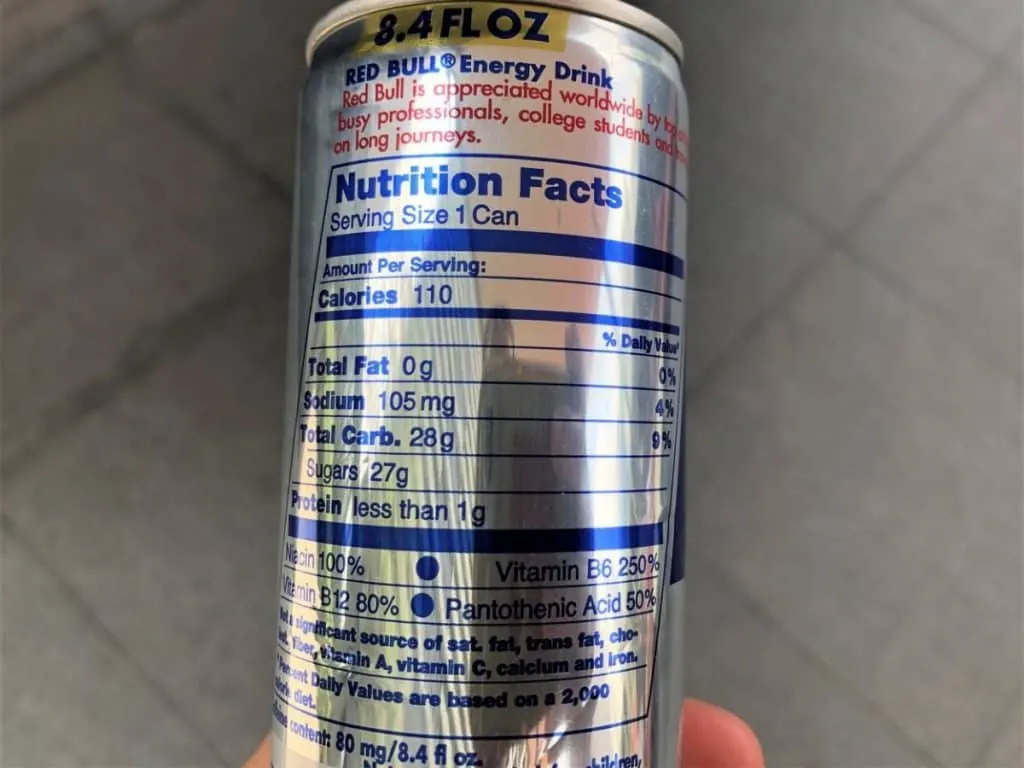
For a more detailed look at what you’re getting nutritionally out of a Red Bull, have a look at the article I’ve written on Red Bull’s Nutrition Facts, for an in-depth and informative analysis.
How Many Calories Are In a Red Bull?
It depends on the size of the Red Bull Can, but a standard 8.4 fl.oz can of Red Bull will run you 110 calories, which is fairly high given it’s relatively small size.
While 110 calories isn’t quite as high as some of the other sugary energy drinks out there (Monster Energy comes to mind), it is worth noting that a can of Red Bull is nearly half the size of a regular 16 fl.oz Monster, which has 210 calories.
As such, from a per fl.oz perspective, a can of Red Bull has just as many calories as Monster, the only difference being that you’ll often Red Bull in much smaller cans.
Now, having a high amount of calories in your energy drink isn’t necessarily a bad thing, you do need a fair amount of calories to get through your day (around 2000 calories for women and 2500 calories for men), so a can of Red Bull can definitely work as a quick pick-me-up if you have no other options.
That being said, while one can of Red Bull may give you a boost, having far too many will result in those calories piling, which can lead to some notable health issues if you’re not too careful about your calorie intake.
A can of Red Bull is also not a great replacement for an actual meal, as although the calories may be present, there’s a big gap between the two when it comes to healthy nutritional content.
To conclude, be sure to moderate your caloric intake if you have a Red Bull, and do remember to have actual meals instead of living off an energy drinks, as the hunger and energy crash when you come off them can be pretty bad without food.
What Ingredients Are Used In Red Bull?
Red Bull doesn’t have the most complicated ingredients list out there, but it certainly gets the job done, here they are below:
- Carbonated water
- Sucrose
- Glucose
- Citric acid
- Taurine
- Sodium bicarbonate
- Magnesium carbonate
- Caffeine
- Niacinamide (Vitamin B3)
- Calcium pantothenate (Vitamin B5)
- Pyridoxine HCl
- Vitamin B12
- Natural and Artificial Flavors
- Colorings
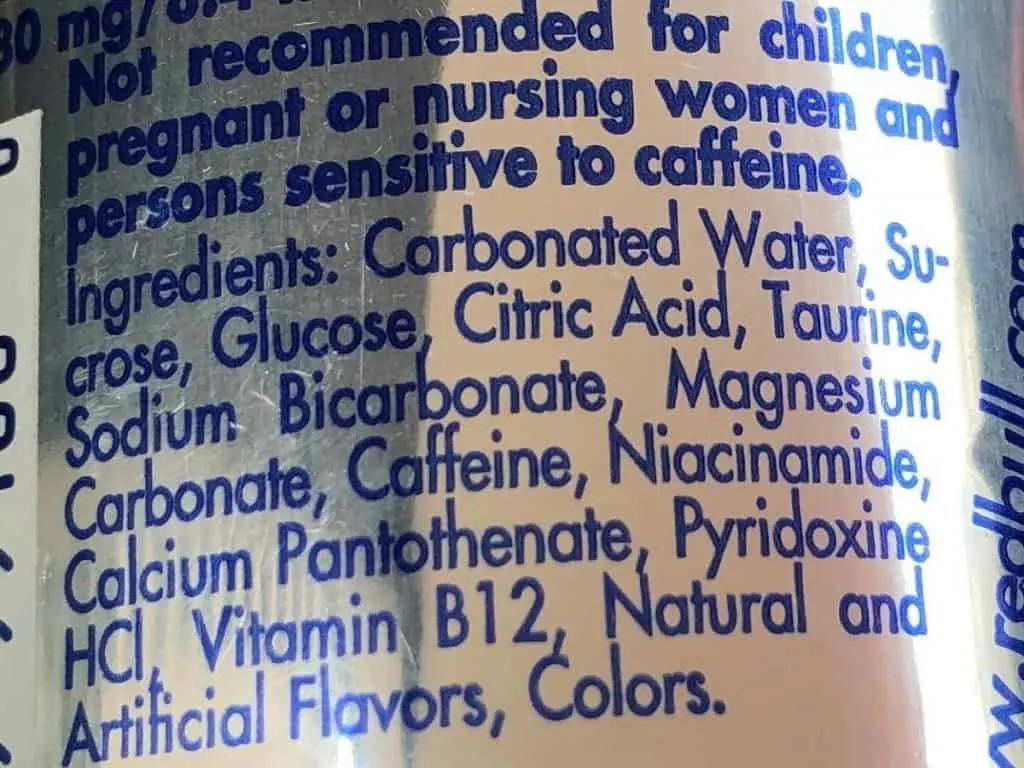
For a brief look at what goes on in a can of Red Bull, the video below should be good enough, but a more detailed look at the ingredients are available further along the article.
Red Bull Caffeine Content
At 80mg of caffeine per 8.4 fl.oz can, Red Bull is definitely lighter on the caffeine than your usual 16 fl.oz regulars, and is definitely the more preferable option if you happen to be caffeine sensitive.
Caffeine is a pretty major component in Red Bull, being one of the ingredients that give you the supposed ‘energy boost’ that you need, as studies have shown that consuming caffeine has a whole host temporary benefits, such as:
- Improved athletic performance
- Improved awareness and response time
- Improved overall cognitive function
When it comes to caffeinated beverages such as energy drinks, it’s not really about how much caffeine is present in the can, but more how much caffeine you can handle before the boosts turns into a mild-headache.
For example, if you’re new and starting out, you probably don’t want to be having 300mg of caffeine per serving in your energy drink, which is the caffeine content you’ll find in both Bang and Reign Energy.
As such, an 8.4 fl.oz can of Red Bull is definitely a good starter point if your new to energy drinks and trying out if all that caffeine business is really for you.
But if you do manage to acquire a taste for caffeinated beverages, you should probably still stick with the 400mg of caffeine daily limit set by the FDA, as having too much caffeine in your system can cause notable side effects, such as:
- Insomnia
- Shakiness
- Restlessness
- Stomachache
- Nausea
- Headaches
All-in-all, caffeine is definitely beneficial in small doses, but be aware not to developed a dependency on the stuff, so be sure to enjoy your Red Bull in moderation.
Red Bull Sugar Content
Consisting of sucrose and glucose, a regular 8.4 fl.oz can of Red Bull has 27g of sugar, which roughly equates to 3.2g per fl.oz.
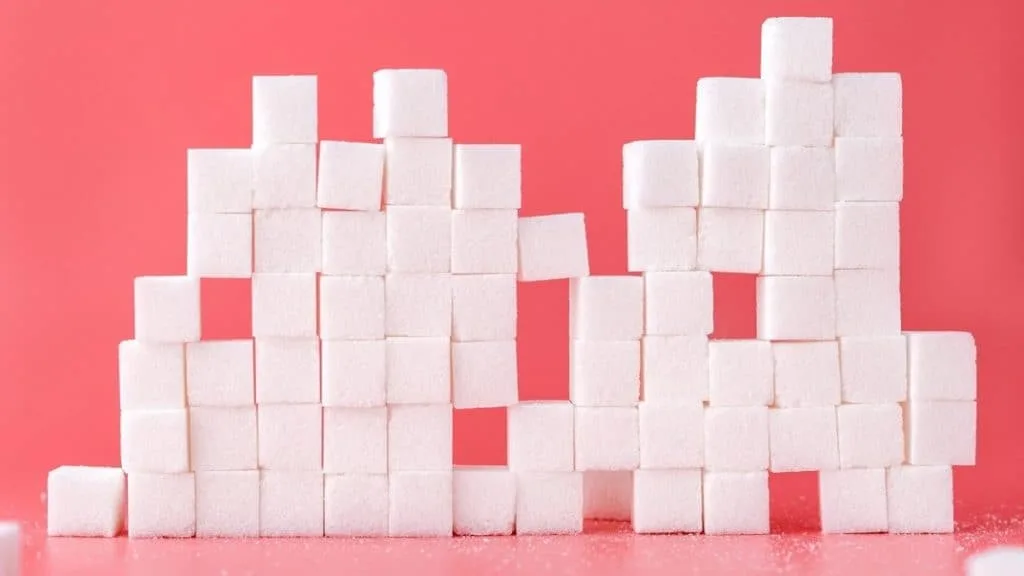
An easy source of energy and a fairly tasty treat, sugar used to be a core part of any energy drink experience, being the main source of ‘energy’ your cells get by breaking down the carbs present.
While the occasional sugary indulgence won’t really affect your health all that much, having too much of the stuff on the regular can have a negative affect on your health, the most serious of which are:
- Cavities
- Joint Pain
- Increased body weight
- Diabetes
- Increased aging of skin
- Acne
Too much sugar in the short-term also isn’t great for you either, as it can often lead to a sugar crash when the sugary high you get from the Red Bull dissipates, and your blood sugar levels return to normal.
As a reference, the American Heart Association recommends a daily added sugar limit of no more than 9 teaspoons (36 grams or 150 calories) of sugar per day for men, and no more than 6 teaspoons (25 grams or 100 calories) per day for women,
Based on the above, an 8.4 fl.oz can of Red Bull is definitely up there in sugar content, and although perfectly fine on occasions, isn’t really something you should be having daily if you plan to stay on the healthy side of life.
Other Ingredients
Citric Acid
A weak organic acid, citric acid is usually found in nature in citrus fruits, but is more often manufactured for commercial use, acting as an acidifier, flavoring, or chelating agent.
If you’ve ever bitten into a lemon or orange, you probably know the effects of citric acid quite well, and has a variety of commercial uses, such as maintaining the pH value of a drink (such as Red Bull) or acting as a preservative.
Of course, having too much citric acid in your diet may cause issues, as it might cause tooth issues (due to the acid wearing down the tooth enamel) or upset stomachs.
That being said, there shouldn’t be too much citric acid in a can of Red Bull, but do be aware that it does contain it
Taurine
An amino acid, taurine, and Red Bull go hand-in-hand, being one of the first few energy drinks to include it as an ingredient, with a long list of potential benefits that come along with it.
Despite the multitude of rumors about its source, the taurine content is actually synthetically sourced (and isn’t derived from a, let’s say, specific part of the bull).
There’s a 1000mg of taurine in every 8.4 fl.oz can of Red Bull, and among its potential benefits include:
- Promoting metabolism
- Protecting the eyes
- Protecting the heart
- Improved exercise performance
That being said, there hasn’t been any solid scientific research on the effects of taurine in energy drinks specifically, and most of them which do mention taurine (such as here and here) also include caffeine, which we know for a fact does work.
So while a fairly harmless ingredient in Red Bull, be sure to take the positive effects of taurine with a grain of salt.
B-Vitamins
Another major selling point of Red Bull, there’s a fairly high amount of B-Vitamins present, if only to make the drink seem healthier than it actually is.
While the Vitamin B6 of Red Bull may look a bit worrying due to it being over 250% of your daily required value, Vitamin B6 is actually water-soluble, and any excess is promptly removed from your body.
I’ve listed out the B-Vitamins found in Red Bull below in an easy-to-read table, but feel free to check out this site if you’re keen to know more about what B-Vitamins actually do for you.
Purpose | Red Bull (Per 8.4 fl.oz) | Daily % Value | Tolerable Upper Intake Level | |
| Vitamin B3 (Niacin) | Converts nutrients to energy; repairs DNA; supports system as an antioxidant. | 22mg | 100% | 35mg |
| Vitamin B5 (Pantothenic Acid) | Breaks down fats, proteins, and coenzyme A; promotes healthy skin | 5mg | 80% | N/A |
| Vitamin B6 | Supports the central nervous system; ensures smooth metabolism | 5mg | 250% | 100mg |
| Vitamin B12 | Generates red blood cells; maintains brain function and nerve tissue health. | 5.1µg | 50% | N/A |
Is Red Bull Alcoholic?
While often used as a mixer in alcoholic beverages, Red Bull by itself is a 100% non-alcoholic, and does not contain any traces of alcohol fresh out of the can.
A quick look at the back of the can will inform you that Red Bull is alcohol-free, so there’s really no need to worry about that supposed rumor when it comes to Red Bull energy drinks.
That being said, it’s actually a really terrible idea to mix energy drinks and alcoholic beverages together, as the effects of alcohol and caffeine counteract each other, making you feel more sober than you actually are.
As such, it’s highly recommended that you do not accept any alcohol that has an energy drink mixed in it, be it Red Bull or otherwise, as the potential consequences can be disastrous.
What does Red Bull do to your brain?
Anxiety, tension, hyperactivity headache, exhaustion, melancholy, disturbed sleep, and mood swings are just some of the negative mental outcomes associated with consuming Red Bull’s numerous unhealthy ingredients.
Furthermore, caffeine and taurine together do not improve short-term memory, but they do cause changes in cardiovascular parameters such as pulse rate and average arterial blood pressure.
Why is Red Bull addictive?
A problem with energy drinks such as Red Bull is that they may increase dopamine production in the brain. One drawback is that the more often you take an energy drink, the less pleasure you get from the accompanying dopamine reaction, which might lead to addiction.
Energy drinks include many ingredients, including caffeine, sugar, and/or artificial sweeteners, which may make them highly addictive for certain consumers. Food addictions, such as an energy drink addiction, exhibit many of the same behavioral characteristics as drug addictions, despite the former’s more superficially benign appearance.
Red Bull VS Monster
The Red Bull VS Monster debate is mostly one of preference, as they contain roughly the same amount of caffeine and sugar per fl.oz as the other, and it’s mostly up to serving size which determines which energy drink you might opt for.
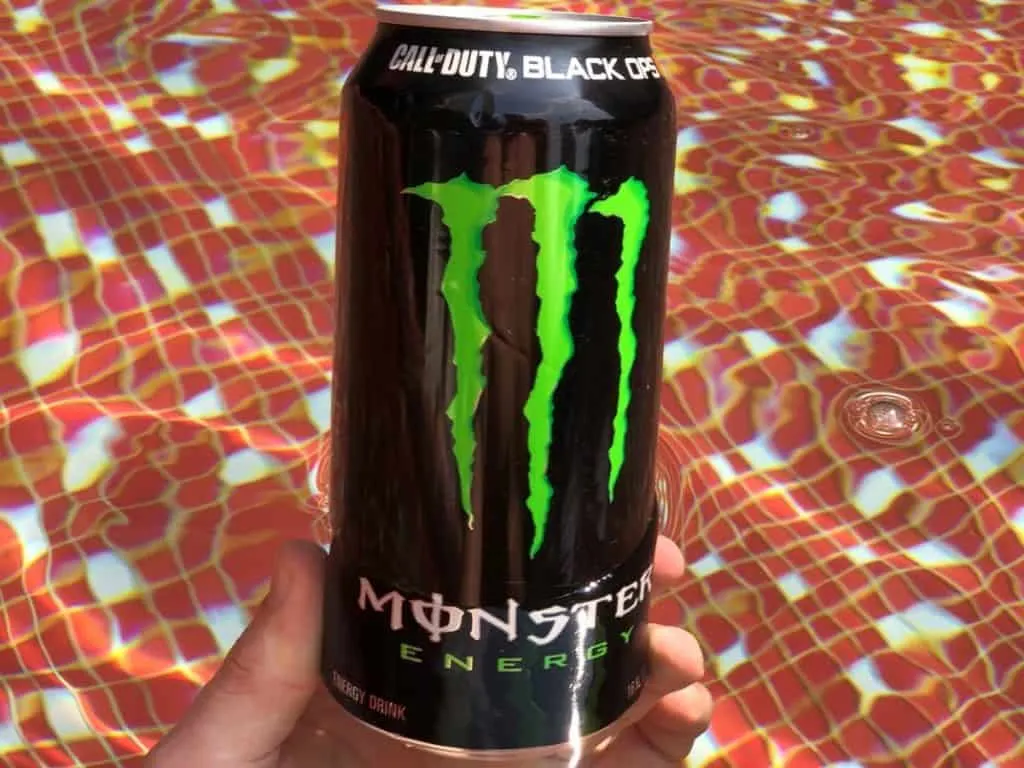
| Red Bull (8.4 fl.oz) | Monster Energy (16 fl.oz) | Max Daily Limits (Female/Male) | |
| Calories | 110 calories | 210 calories | 2000/2500 calories |
| Caffeine | 80mg | 160mg | 400mg |
| Sugar | 27g | 52g | 25g/36g |
From a pure health perspective, the usually smaller Red Bull can is a lot less excessive if all you need is a quick pick-me-up. Granted, you’re not exactly supposed to down an entire 16 fl.oz Monster in one go.
To be frank, both energy drinks aren’t all that great for you, but if you’re looking for a sugar rush and aren’t too concerned about the consequences, then either of them will serve you just fine, brand-loyalty notwithstanding.
Final Thoughts
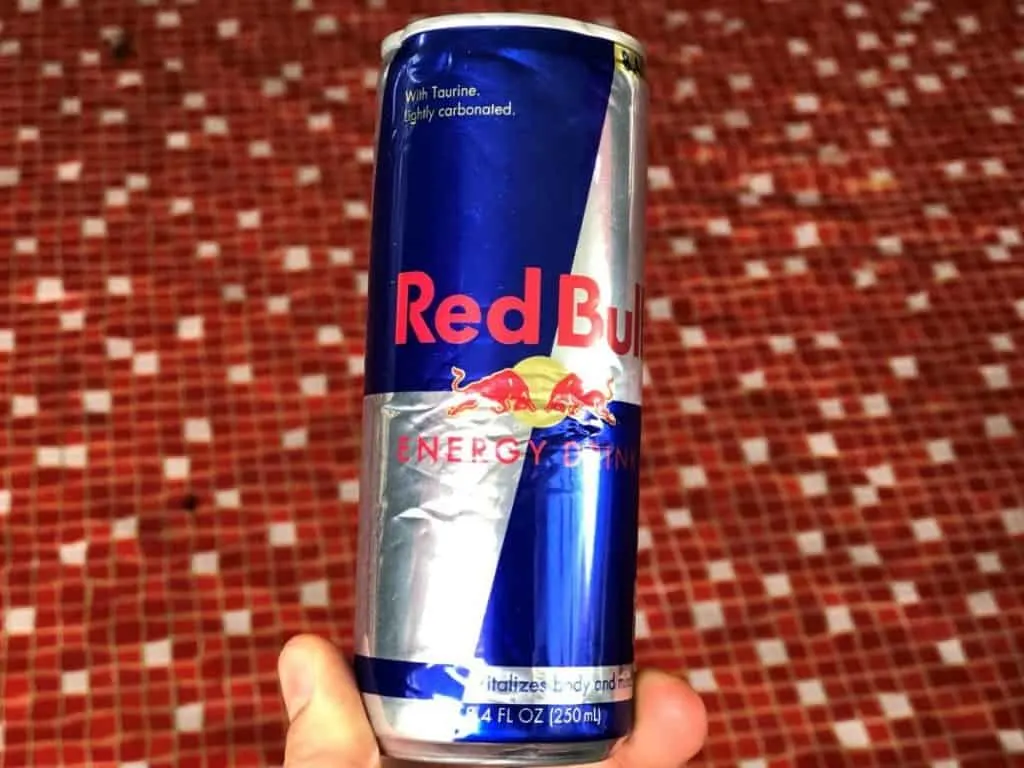
All-in-all, Red Bull is as classic as an energy drink gets; no fancy ingredients or excessive amounts of caffeine, just a moderate amount of sugar, caffeine and B-vitamins blended into an alright concoction.
Sure, a can of Red Bull isn’t going to win any prizes for being the healthiest energy drink on the market, but you certainly can’t deny that all that sugar and caffeine can definitely give you the boost you need, when you need it.
Just be sure to know both your caffeine and sugar limits; while great on occasion, having too much Red Bull may cause some issues, so be sure not too fly too close to the sun, or you’ll risk losing your wings.
